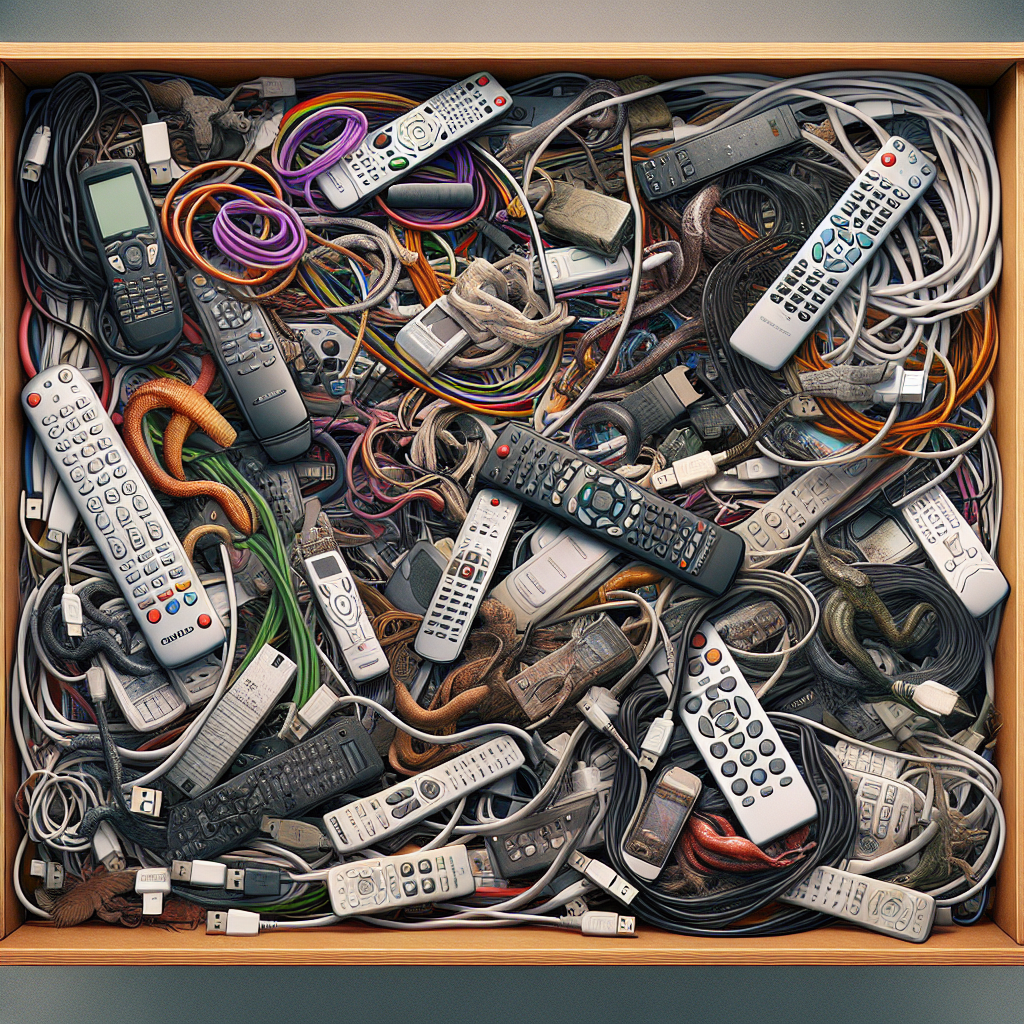A group called Material Focus is worried about the problem of unused electricals and broken technology in homes. They say that the average number of these items being kept has gone up from 20 to 30 in the past four years. The top ten things that people keep are remote controls, mobile phones, and hairdryers. The United Nations says that electronic waste is increasing five times faster than recycling. They want people to clean out their “drawers of doom” and get rid of these items properly.
One person who admits to keeping lots of electricals is Paul Bowtell. He has over 40 items in just a couple of boxes, and even more in his attic, drawers, footstool, and other boxes. Some of the things belong to his grown-up sons, and some were once expensive but aren’t worth anything now. Scott Butler from Material Focus thinks that everyone probably has a “drawer of doom” filled with cables and remote controls for things they don’t use anymore.
Material Focus thinks that there are over 880 million unused electrical items in UK homes. They say that we should never throw these things in the normal rubbish because they have valuable materials that can be recycled. These materials include steel, aluminum, copper, batteries, and even gold. Getting these materials in the first place causes pollution, harms animals, and makes climate change worse. So it’s important to recycle and get the value from these items.
Sarah Burns from Bristol Waste says that it’s important to have fewer electrical items in the first place. One way to do this is by sharing them. For example, at Share Bristol – A Library of Things, people can borrow things like sanders, hedge trimmers, and popcorn makers that they don’t need every day. If you have extra laptops or smart devices, you can also give them to people who need them by searching for “recycle your electricals” to find places to drop them off.
Material Focus says that households in the UK are throwing away 103,000 tonnes of electricals instead of recycling them. They also think that 343,000 tonnes of electrical waste are being stolen or illegally taken out of the waste system. They got these numbers by asking 2,000 adults in the UK about their habits.
Original news source: E-waste drawers of doom growing, say campaigners (BBC)
🎧 Listen:
Slow
Normal
Fast
📖 Vocabulary:
| 1 | electricals | Things like phones, laptops, and kitchen appliances that use electricity |
| 2 | recycling | The process of converting waste into reusable material |
| 3 | pollution | The introduction of harmful substances into the environment |
| 4 | valuable | Worth a lot of money or very useful |
| 5 | climate change | Changes in global weather patterns, often seen as a result of harmful environmental practices |
| 6 | recycle | To process used or waste materials so they can be used again |
| 7 | materials | The substances or components something is made of |
| 8 | admits | Confesses or acknowledges something reluctantly |
| 9 | illegal | Not allowed by law |
| 10 | stolen | Taken without permission |
| 11 | households | Groups of people living together in one place, often referring to their place of residence |
| 12 | devices | Tools or machines, often electronic, used for specific tasks |
| 13 | borrowed | Taken temporarily for use with the intention of returning |
| 14 | waste | Garbage or refuse |
| 15 | habits | Regular actions or practices of people, often done without much thought |
Group or Classroom Activities
Warm-up Activities:
– Charades
Instructions: Divide the class into small groups. Each group will take turns acting out a word or phrase related to the article, such as “drawer of doom,” “recycling,” or “electrical waste.” The other groups will try to guess the word or phrase within a certain time limit. The team that guesses correctly gets a point. Repeat with different words or phrases.
– News Summary
Instructions: Have the students work individually or in pairs to write a summary of the article in their own words. Encourage them to include the main points and key details. After a designated amount of time, have the students share and compare their summaries with a partner. Discuss as a class and highlight any differences or interesting points.
– Opinion Poll
Instructions: Divide the class into pairs or small groups. Give each group a list of statements related to the article, such as “Everyone should recycle their unused electrical items” or “Sharing electrical items is a good way to reduce waste.” Have each group discuss their opinions on each statement and come to a consensus. Then, have each group share their opinions with the class and facilitate a class discussion on the different perspectives.
– Vocabulary Pictionary
Instructions: Provide the students with a list of vocabulary words from the article, such as “electricals,” “recycling,” or “pollution.” Divide the class into small groups. Each group will take turns choosing a word and drawing a picture to represent it. The other groups will try to guess the word based on the drawing. The group that guesses correctly gets a point. Repeat with different words.
– Future Predictions
Instructions: Have the students work individually or in pairs to make predictions about the future of electronic waste and recycling based on the information in the article. Encourage them to consider the potential consequences, challenges, and solutions. After a designated amount of time, have the students share and discuss their predictions in small groups or as a class.
🤔 Comprehension Questions:
1. What is Material Focus worried about?
2. According to the article, what are the top three items that people keep in their homes?
3. How does the United Nations describe the rate at which electronic waste is increasing compared to recycling?
4. Why does Material Focus want people to clean out their “drawers of doom” and get rid of unused electricals properly?
5. Why does Paul Bowtell keep lots of electricals?
6. What valuable materials can be recycled from unused electrical items?
7. According to Sarah Burns, why is it important to have fewer electrical items in the first place?
8. How did Material Focus gather data about the amount of electrical waste being thrown away and illegally taken out of the waste system?
Go to answers ⇩
🎧✍️ Listen and Fill in the Gaps:
A group called Material Focus is (1)______ about the problem of unused (2)______ and broken technology in homes. They say that the average number of these items being kept has gone up from 20 to 30 in the past four years. The top ten (3)______ that people keep are remote controls, mobile phones, and hairdryers. The United Nations says that electronic (4)______ is increasing five times faster than recycling. They want people to clean out their “drawers of doom” and get rid of these items properly.
One person who admits to keeping lots of electricals is Paul Bowtell. He has over 40 (5)______ in just a (6)______ of boxes, and even more in his attic, drawers, footstool, and other boxes. Some of the things belong to his grown-up sons, and some were once expensive but aren’t worth anything now. Scott (7)______ from Material Focus thinks that everyone probably has a “drawer of doom” filled with cables and remote (8)______ for things they don’t use anymore.
Material Focus thinks that there are over 880 million unused electrical items in UK homes. They say that we should never throw these things in the normal rubbish because they have valuable (9)______ that can be recycled. These materials include steel, aluminum, copper, batteries, and even gold. Getting these materials in the first place causes pollution, harms animals, and makes (10)______ change worse. So it’s important to recycle and get the value from these items.
Sarah Burns from (11)______ Waste says that it’s important to have fewer electrical items in the first place. One way to do this is by (12)______ them. For example, at Share Bristol – A Library of Things, people can borrow things like sanders, (13)______ trimmers, and popcorn makers that they don’t need every day. If you have extra laptops or (14)______ devices, you can also give them to people who need them by searching for “recycle your electricals” to find places to drop them off.
Material Focus says that (15)______ in the UK are throwing away 103,000 tonnes of electricals instead of recycling them. They also (16)______ that 343,000 tonnes of electrical waste are being stolen or illegally taken out of the waste system. They got these numbers by asking 2,000 adults in the UK about their habits.
Go to answers ⇩
💬 Discussion Questions:
Students can ask a partner these questions, or discuss them as a group.
1. What is Material Focus and why are they worried about unused electricals and broken technology in homes?
2. How many items on average are people keeping in their homes, according to Material Focus?
3. Do you have a “drawer of doom” filled with items you don’t use anymore? Why or why not?
4. How would you feel if you had over 40 electrical items in your house like Paul Bowtell? Why?
5. Do you think it’s important to recycle unused electrical items? Why or why not?
6. Why does Material Focus say we should never throw these items in the normal rubbish?
7. What valuable materials can be recycled from unused electrical items?
8. How does getting these materials in the first place affect the environment?
9. Do you agree with Sarah Burns that it’s important to have fewer electrical items in the first place? Why or why not?
10. Have you ever borrowed something from a library of things or shared an electrical item with someone? How was your experience?
11. How much electrical waste do households in the UK throw away instead of recycling, according to Material Focus?
12. Why do you think some people choose to illegally take electrical waste out of the waste system?
13. Do you think the numbers provided by Material Focus accurately represent the habits of adults in the UK? Why or why not?
14. How could you personally help reduce the amount of electrical waste in your community?
15. What do you think would happen if everyone in the UK recycled their unused electrical items properly?
Individual Activities
📖💭 Vocabulary Meanings:
Match each word to its meaning.
Words:
1. electricals
2. recycling
3. pollution
4. valuable
5. climate change
6. recycle
7. materials
8. admits
9. illegal
10. stolen
11. households
12. devices
13. borrowed
14. waste
15. habits
Meanings:
(A) Changes in global weather patterns, often seen as a result of harmful environmental practices
(B) Confesses or acknowledges something reluctantly
(C) Things like phones, laptops, and kitchen appliances that use electricity
(D) Tools or machines, often electronic, used for specific tasks
(E) Taken temporarily for use with the intention of returning
(F) The substances or components something is made of
(G) Taken without permission
(H) The process of converting waste into reusable material
(I) The introduction of harmful substances into the environment
(J) Regular actions or practices of people, often done without much thought
(K) Groups of people living together in one place, often referring to their place of residence
(L) Worth a lot of money or very useful
(M) To process used or waste materials so they can be used again
(N) Not allowed by law
(O) Garbage or refuse
Go to answers ⇩
🔡 Multiple Choice Questions:
1. What is Material Focus worried about?
(a) Unused electricals and broken technology in homes
(b) Global warming
(c) Overpopulation
(d) Food waste
2. According to the United Nations, how fast is electronic waste increasing compared to recycling?
(a) Ten times faster
(b) Twice as fast
(c) Five times faster
(d) The same speed
3. What are the top three things that people keep, according to Material Focus?
(a) Books, clothes, and toys
(b) Food, drinks, and medicine
(c) Cars, bikes, and furniture
(d) Remote controls, mobile phones, and hairdryers
4. Why does Material Focus say we should never throw unused electricals in the normal rubbish?
(a) They have valuable materials that can be recycled
(b) They take up too much space
(c) They are dangerous
(d) They are too heavy
5. What are some of the valuable materials that can be recycled from unused electricals?
(a) Plastic, glass, paper, and wood
(b) Rubber, fabric, glass, and silver
(c) Steel, aluminum, copper, batteries, and gold
(d) Iron, tin, lead, and platinum
6. How can people have fewer electrical items in the first place, according to Sarah Burns?
(a) By throwing them away
(b) By sharing them
(c) By buying more of them
(d) By hiding them in the attic
7. How much electrical waste do households in the UK throw away instead of recycling, according to Material Focus?
(a) 1 million tonnes
(b) 500,000 tonnes
(c) 10,000 tonnes
(d) 103,000 tonnes
8. How did Material Focus get their numbers about electrical waste in the UK?
(a) By conducting a scientific study
(b) By asking 2,000 adults in the UK about their habits
(c) By guessing
(d) By looking at government reports
Go to answers ⇩
🕵️ True or False Questions:
1. Material Focus estimates that there are over 880 million unused electrical items in UK homes.
2. Paul Bowtell denies hoarding a large number of electricals, with over 40 items in just a few boxes, as well as more in his attic, drawers, footstool, and other boxes.
3. Material Focus emphasizes the importance of recycling these items as they contain valuable materials such as steel, aluminum, copper, batteries, and even gold.
4. The United Nations has reported that electronic waste is growing at a rate five times slower than recycling.
5. Material Focus is not urging people to clean out their “drawers of doom” and dispose of these items properly.
6. The top ten things that people tend to discard are remote controls, mobile phones, and hairdryers.
7. Material Focus is concerned about the increasing amount of unused electricals and broken technology in people’s homes.
8. The average number of these items being kept has risen from 20 to 30 in the past four years.
Go to answers ⇩
📝 Write a Summary:
Write a summary of this news article in two sentences.
Check your writing now with the best free AI for English writing!
Writing Questions:
Answer the following questions. Write as much as you can for each answer.
Check your answers with our free English writing assistant!
1. What is Material Focus worried about?
2. How much has the average number of unused electricals and broken technology in homes increased in the past four years?
3. What are the top three things that people keep in their “drawers of doom”?
4. Why does Material Focus want people to get rid of these items properly?
5. How can people reduce the number of electrical items they have in the first place?
✅ Answers
🤔✅ Comprehension Question Answers:
1. What is Material Focus worried about?
Material Focus is worried about the problem of unused electricals and broken technology in homes.
2. According to the article, what are the top three items that people keep in their homes?
The top three items that people keep in their homes are remote controls, mobile phones, and hairdryers.
3. How does the United Nations describe the rate at which electronic waste is increasing compared to recycling?
The United Nations says that electronic waste is increasing five times faster than recycling.
4. Why does Material Focus want people to clean out their “drawers of doom” and get rid of unused electricals properly?
Material Focus wants people to clean out their “drawers of doom” and get rid of unused electricals properly because these items have valuable materials that can be recycled, and getting these materials in the first place causes pollution, harms animals, and makes climate change worse.
5. Why does Paul Bowtell keep lots of electricals?
Paul Bowtell keeps lots of electricals because some of them belong to his grown-up sons, and some were once expensive but aren’t worth anything now.
6. What valuable materials can be recycled from unused electrical items?
Valuable materials that can be recycled from unused electrical items include steel, aluminum, copper, batteries, and even gold.
7. According to Sarah Burns, why is it important to have fewer electrical items in the first place?
According to Sarah Burns, it is important to have fewer electrical items in the first place because it reduces the need for manufacturing new items, which causes pollution, harms animals, and contributes to climate change.
8. How did Material Focus gather data about the amount of electrical waste being thrown away and illegally taken out of the waste system?
Material Focus gathered data about the amount of electrical waste being thrown away and illegally taken out of the waste system by asking 2,000 adults in the UK about their habits.
Go back to questions ⇧
🎧✍️✅ Listen and Fill in the Gaps Answers:
(1) worried
(2) electricals
(3) things
(4) waste
(5) items
(6) couple
(7) Butler
(8) controls
(9) materials
(10) climate
(11) Bristol
(12) sharing
(13) hedge
(14) smart
(15) households
(16) think
Go back to questions ⇧
📖💭✅ Vocabulary Meanings Answers:
1. electricals
Answer: (C) Things like phones, laptops, and kitchen appliances that use electricity
2. recycling
Answer: (H) The process of converting waste into reusable material
3. pollution
Answer: (I) The introduction of harmful substances into the environment
4. valuable
Answer: (L) Worth a lot of money or very useful
5. climate change
Answer: (A) Changes in global weather patterns, often seen as a result of harmful environmental practices
6. recycle
Answer: (M) To process used or waste materials so they can be used again
7. materials
Answer: (F) The substances or components something is made of
8. admits
Answer: (B) Confesses or acknowledges something reluctantly
9. illegal
Answer: (N) Not allowed by law
10. stolen
Answer: (G) Taken without permission
11. households
Answer: (K) Groups of people living together in one place, often referring to their place of residence
12. devices
Answer: (D) Tools or machines, often electronic, used for specific tasks
13. borrowed
Answer: (E) Taken temporarily for use with the intention of returning
14. waste
Answer: (O) Garbage or refuse
15. habits
Answer: (J) Regular actions or practices of people, often done without much thought
Go back to questions ⇧
🔡✅ Multiple Choice Answers:
1. What is Material Focus worried about?
Answer: (a) Unused electricals and broken technology in homes
2. According to the United Nations, how fast is electronic waste increasing compared to recycling?
Answer: (c) Five times faster
3. What are the top three things that people keep, according to Material Focus?
Answer: (d) Remote controls, mobile phones, and hairdryers
4. Why does Material Focus say we should never throw unused electricals in the normal rubbish?
Answer: (a) They have valuable materials that can be recycled
5. What are some of the valuable materials that can be recycled from unused electricals?
Answer: (c) Steel, aluminum, copper, batteries, and gold
6. How can people have fewer electrical items in the first place, according to Sarah Burns?
Answer: (b) By sharing them
7. How much electrical waste do households in the UK throw away instead of recycling, according to Material Focus?
Answer: (d) 103,000 tonnes
8. How did Material Focus get their numbers about electrical waste in the UK?
Answer: (b) By asking 2,000 adults in the UK about their habits
Go back to questions ⇧
🕵️✅ True or False Answers:
1. Material Focus estimates that there are over 880 million unused electrical items in UK homes. (Answer: True)
2. Paul Bowtell denies hoarding a large number of electricals, with over 40 items in just a few boxes, as well as more in his attic, drawers, footstool, and other boxes. (Answer: False)
3. Material Focus emphasizes the importance of recycling these items as they contain valuable materials such as steel, aluminum, copper, batteries, and even gold. (Answer: True)
4. The United Nations has reported that electronic waste is growing at a rate five times slower than recycling. (Answer: False)
5. Material Focus is not urging people to clean out their “drawers of doom” and dispose of these items properly. (Answer: False)
6. The top ten things that people tend to discard are remote controls, mobile phones, and hairdryers. (Answer: False)
7. Material Focus is concerned about the increasing amount of unused electricals and broken technology in people’s homes. (Answer: True)
8. The average number of these items being kept has risen from 20 to 30 in the past four years. (Answer: True)
Go back to questions ⇧















